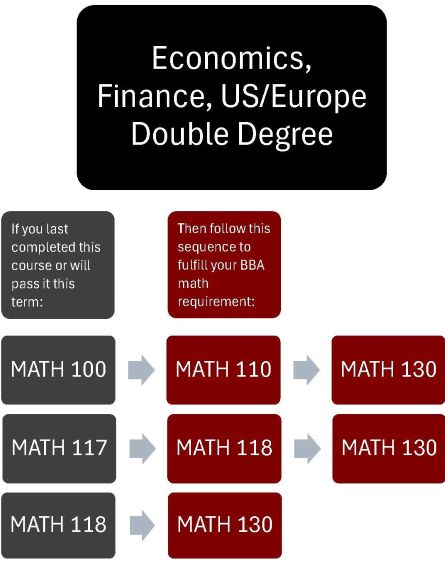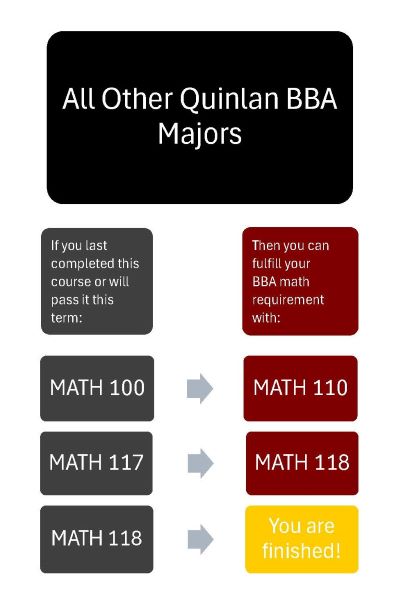Loyola University > Quinlan School of Business > Academics > Student Resources > Undergraduate Resources > Quinlan BBA Core Revisions
Quinlan BBA Core Revisions
The Quinlan BBA core revision falls into four buckets:
Please note: The following revisions will only affect students graduating in fall 2024 and beyond.
- Creating two new business-oriented MATH courses and “right-sizing” the MATH requirements for the math knowledge and skills that students in each Quinlan major will need post-graduation
- Adding one new option to fulfill the BBA core statistics requirement and one new option to fulfill the BBA core data analytics requirement
- Developing two new introductory courses for Quinlan students starting in fall 2024 onward to learn about majors, careers, and personal finance
- Instituting a “pre-test” for incoming first-year students and “post-test” for those same students in senior year that will help us to make sure the core curriculum is serving its intended purpose
MATH Courses
We heard from students and alumni that requiring calculus credit for all Quinlan majors (through at least MATH 131) was absorbing a significant number of courses and credits in exchange for math skills that many students would never actually need in the workplace.
To resolve this problem, we allowed the Quinlan academic departments to decide — based on their knowledge of jobs in industry and employer and alumni feedback — whether students in their majors should have to take through calculus or precalculus.
- Outcome: In the revised core, finance and economics majors must have MATH credit on their transcript through calculus. All other majors must have MATH credit on their transcript through precalculus.
We also wanted to make sure that any MATH courses Quinlan students are taking are relevant to their major interests and eventual careers. Ideally, business math courses should incorporate examples or problems that reflect the business environment.
- Outcome: The math department collaborated with us to design two new business-focused courses: MATH 110 Business Precalculus and MATH 130 Business Calculus.
MATH 110 replaces the two-course sequence of MATH 117 + MATH 118 for BBA students. This means that students can now satisfy the precalculus requirement with one course instead of two, yielding an additional space for an elective or other course of interest.
MATH 130 is an alternative to MATH 131 or MATH 161 for BBA students. Students majoring in economics or finance can use this business calculus course to satisfy their math requirement.
We heard from students and alumni that requiring calculus credit for all Quinlan majors (through at least MATH 131) was absorbing a significant number of courses and credits in exchange for math skills that many students would never actually need in the workplace.
To resolve this problem, we allowed the Quinlan academic departments to decide — based on their knowledge of jobs in industry and employer and alumni feedback — whether students in their majors should have to take through calculus or precalculus.
- Outcome: In the revised core, finance and economics majors must have MATH credit on their transcript through calculus. All other majors must have MATH credit on their transcript through precalculus.
We also wanted to make sure that any MATH courses Quinlan students are taking are relevant to their major interests and eventual careers. Ideally, business math courses should incorporate examples or problems that reflect the business environment.
- Outcome: The math department collaborated with us to design two new business-focused courses: MATH 110 Business Precalculus and MATH 130 Business Calculus.
MATH 110 replaces the two-course sequence of MATH 117 + MATH 118 for BBA students. This means that students can now satisfy the precalculus requirement with one course instead of two, yielding an additional space for an elective or other course of interest.
MATH 130 is an alternative to MATH 131 or MATH 161 for BBA students. Students majoring in economics or finance can use this business calculus course to satisfy their math requirement.
Please see the flowcharts below for how these change affects students in different majors.


New Course Options for Statistics and Analytics
In the prior version of the BBA core, all Quinlan students needed to take ISSCM 241 Business Statistics. We compared the syllabus for this course with the syllabus for STAT 101 Fundamentals of Statistics and found that both courses effectively deliver the same content. This gave us an avenue to offer students more options to fulfill their BBA core statistics requirement.
- Outcome: Quinlan students can now fulfill the BBA core statistics requirement by completing either ISSCM 241 or STAT 103.
Similarly, in the prior version of the BBA core, all Quinlan students needed to take INFS 343 Business Analytics. We asked the Quinlan academic departments whether there were any other courses that students could take to achieve the same learning goals, and the economics department offered the inclusion of ECON 346 Econometrics.
- Outcome: Quinlan students can now fulfill the BBA core data analytics requirement with either INFS 343 or ECON 346.
New Introductory Courses
Many students and alumni told us that they would have benefited from a Quinlan-specific introduction to business majors and careers in their first year, which is when many people are trying to make crucial decisions about their academic path.
- Outcome: We developed a new 1-credit course called QUIN 101 Business Learning and Careers that, starting in fall 2024, all first-year Quinlan students will take in their first spring semester. Each week will focus on a different major and allow students to meet (either in person or virtually) a Loyola alumnus or alumna who is working in that field. New Quinlan students will take this in addition to UNIV 101.
Alumni also told us that understanding personal finance earlier in their college years would have helped them better manage important tasks such as budgeting, saving, taking loans, buying insurance, and maybe beginning to invest.
- Outcome: The finance department created a 0-credit course called QUIN 102 Financial Literacy and Well-Being that students will take online asynchronously at the same time as they take QUIN 101. Topics will include measuring and managing spending, how much to save (and in what kind of account), how credit bureaus determine FICO scores, avoiding identity theft, and how inflation affects you.
You may notice that these courses have a QUIN course code, which you have never seen before. It is new! We introduced this course code with the BBA core revision to replace the old BSAD designation. For example, the BSAD 220 Career Preparation course still exists, but it is now numbered QUIN 202. If you have not taken this course yet, you will take it (and it will appear on your transcript) as QUIN 202 Career Preparation.
Pre-Test and Post-Test
You are familiar with ways in which your course instructors assess your learning at the end of a semester: final exams, final presentations, capstone projects, and more. Well, how do you assess a student’s learning across an entire business core curriculum?
Until now, Quinlan hasn’t had a comprehensive instrument to make that assessment. But faculty and administrators wanted to design something that would allow us to evaluate students’ learning and make sure the BBA core is really doing the job it sets out to do — to give you a strong grasp of the fundamentals of business.
- Outcome: The revised BBA core will offer all incoming first-year students a “pre-test” on topics covered in the core (which we of course do not expect them to know; this is just to set a baseline). Right before those students graduate, those students will take a similar “post-test” that will assess the change in their business knowledge over the course of their time at Quinlan. We can use the results to make informed decisions on how and where to improve the curriculum. This process will be in place for all students entering in fall 2024 or later.